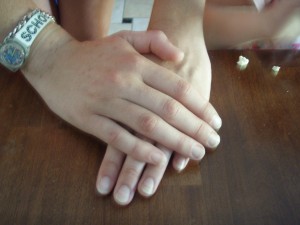 Despite what the New York Times and other critics say about memoir, I happen to love the genre—and not just because I write it myself. I love memoir because it grants me temporary access into someone else’s head. I learn things I never would have learned otherwise.
Despite what the New York Times and other critics say about memoir, I happen to love the genre—and not just because I write it myself. I love memoir because it grants me temporary access into someone else’s head. I learn things I never would have learned otherwise.
Take, for example, the post entitled Quiet Hands by Julia Bascom. Julia has autism, although I suspect most people reading her work would never guess. Or wouldn’t if she wrote about something other than what it means to grow up autistic in this country. I can’t get enough of her writing. I can’t get enough of it because she explains all the things my daughter Katie can’t yet explain.
Perhaps I should explain.
Unlike Julia, Katie doesn’t flap often, as many on the spectrum do, but she touches absolutely EVERYTHING. I’ve never told her “quiet hands,” but I have told her on many, many occasions to stop touching. Don’t put your hands in that stranger’s purse, don’t handle all the produce at the grocery store, don’t touch the tires on that monster truck, don’t touch the fragile things at Grandma’s house. I assumed her need to touch was based on a lack of social boundaries and nothing more.
Then I read Quiet Hands and realized that like Julia, Katie may use her hands to make sense of her world, a world that is more often than not painful and terrifyingly out-of-control. She uses her hands to gather and process information. So when I tell her to stop touching, what I am really saying is this: Stop expressing yourself. Or more bluntly, stop talking.
Or worse, I don’t want to hear what you are trying to say.
Or worse yet, you are broken and bad. I don’t accept you the way you are.
I had no idea, absolutely no idea, what I was telling her with my well-meaning words. Clearly I need to rethink my approach. There must be a better way to balance her needs with those of, well, pretty much everyone else.
What struck me when I read Quiet Hands was the memory of all the times the aides in Katie’s speech-intensive preschool program did hand-over-hand with her and how, even at 2, prior to her diagnosis, she fought it—fought it as if her life depended on it. I figured out pretty quickly that if you sat next to Katie and showed her what you wanted, she would copy your actions. No fighting involved. But I had to beg the aides to stop with the hand-over-hand. I literally had to beg until one of them agreed to try it my way and saw that it worked.
Even now, 5 years later, I still need to tell new therapists not to do the dreaded hand-over-hand. The response is, more often than not, but that’s how we’re supposed to do it. Some listen to me; most insist on doing it anyway. Katie responds so aggressively that they stop trying pretty quickly.
It makes me sad that she has to fight so hard to be heard. But thanks to Julia, I now understand what Katie is fighting for.
Until next time,
Cynthia Patton




Another beautiful insight Cynthia! I will be sharing this with Special Ed teachers I work with!
Thanks. Please do. I think the line in Quiet Hands that struck me the most was this: When it’s autism it’s not abuse. It’s therapy.
I can’t tell you as a parent how that made me feel. It’s such a fine line when working with non-verbal kids to know when our well-meaning actions become less helpful rather than more.
Great story. I wonder also if maybe her need to touch is akin to a dog’s need to smell to gather information about the world. (Okay, maybe it wouldn’t be a good idea for Katie to go around touching people’s butts.)
There is much we have to learn about being human from those on the autism spectrum.
Exactly, Karen. Even though I hate to compare my child to a dog. : )
Like you, I read the same post and walked away with a wake-up call. I am starting to question our ‘normal’ society. I don’t think we are as smart as we once thought we were.
No, we are defiitely not as smart as we think we are and there is clearly a great deal we still need to learn about autism.
I’m glad you found me. I can’t wait to check out your blog.
Two things from my experiences as a toucher:
1) yay touching! May be a good idea to get a bunch of different types of hand wipes or sanitizing gel and have a mother-daughter time with your daughter figuring out which one she likes/tolerates the best. This is so that she can wipe her hands clean with something *she* is okay with if she touches something super dirty like building walls and fences, or (eventually) before she touches the veggies at the market. Not 100% needed, of course, but it can help keep someone healthy. Especially if your daughter ever sticks her fingers in her mouth like I do without thinking about it.
2) Yay, touching! But it’s a good idea to talk about/teach about age appropriate consent issues like not touching people without their permission, and how other people shouldn’t touch her without her permission. I’m a big believer in this as being a foundation for self-advocacy that is age appropriate, and it sounds like you’ve already started doing this by modeling when you tell the people working with her not to do hand-over-hand! That is exactly the sort of learning opportunity I’m talking about.
Hi Savannah! Nice to meet you. Both my daughter and my dog have stuck their heads under women’s dresses. As far as I know, I did not. My mother would have been horribly scandalized. : )
Excellent suggestions. While my daughter did have a few tactile issues when young, for the most part she will touch any wipe or gel if she’s in control. (Just don’t try and make her do it.) But she’s very mouthy in addition to touching everything and this would help to decrease my anxiety when she touches those car tires! Wow, why didn’t I think of that? And I LOVE suggestion #2, because really, touching is a two-way street. She doesn’t like people touching her without permission, and I think this might be an excellent way to explain to her why she needs to ask first with others, even when talking is difficult. Love the self-advocacy part as well. Yay touching!
Looking forward to checking out your blog as well. Thanks for stopping by!